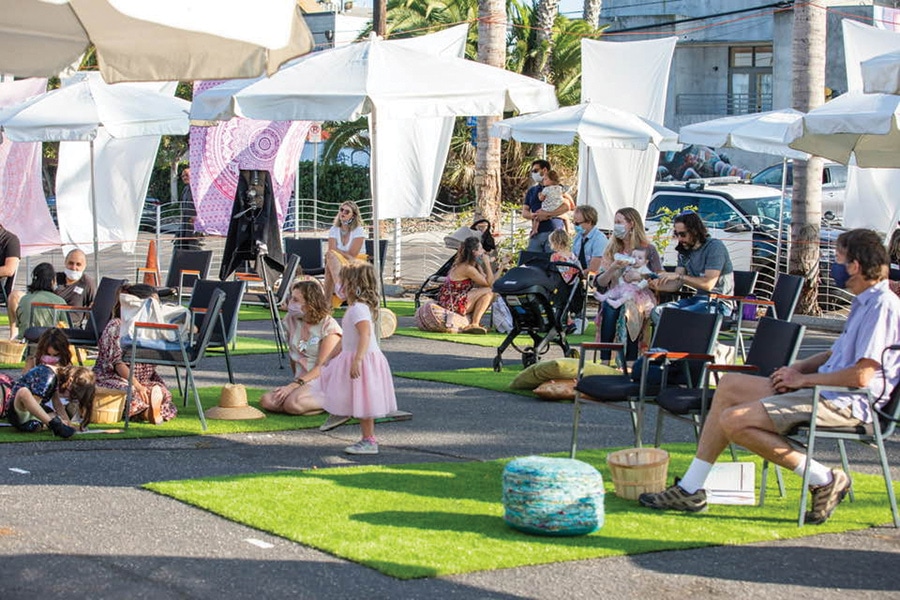 Photo from Open Temple Facebook page
Photo from Open Temple Facebook page When I arrived for Open Temple’s Rosh Hashanah services at the Electric Lodge in Venice, the parking lot resembled an asphalt beach club. Family “pods” consisting of two to four folding chairs sat on top of square AstroTurf pads, shielded by individual umbrellas and spaced at seven-foot intervals like individual islands.
Unlike virtually every other synagogue in Los Angeles, the Open Temple, led by Rabbi Lori Shapiro, created an environment to allow about 50 congregants to gather safely and worship this Rosh Hashanah outside together. As Rabbi Shapiro expressed in her opening remarks, “Judaism has always adapted through time, so we allow Judaism to adapt through this incredible experience today.”
Full disclosure: my sister was recently appointed president of the Open Temple board, and I was there primarily to support her in this new role. In a normal year, my family would have attended our local Chabad with friends we’ve known for decades. But nothing about this year is typical. Not in the world and not in my home. It’s only September, yet 2020 has already handed me an abrupt marital separation, a worldwide pandemic, a city-wide lockdown, a youngest child’s departure for college, and in the midst of it all, an urgent and final deadline to finish a book about—unbelievably—grief.
I work in the bereavement world, but that doesn’t make me immune to sorrow. Suffice it to say, I’m ready to symbolically and literally turn the calendar on this year, be it 2020 or 5780. So when Rabbi Shapiro stepped over to a tub of water and asked everyone to call out what they were washing away from the past year—“Judgment!” “Shame!” “Zoom!” “Kids on iPads!”—I shouted, “Loss!” and “Fear!” It felt good to hand it over in such a loud and public manner.
Sometimes it’s possible to show up with an open mind, not knowing what you’ll find, and to discover exactly what you need.
The Open Temple’s tag line is “Reinventing Judaism for the Jew-ishly Curious and Those Who Love Them,” so from the start, you get the idea that their version of Rosh Hashanah will be an adventure. Rabbi Shapiro led the service from behind a plastic face shield, donning a cordless head mic and an iPad hanging from a long harness. She wore a floor-length crimson dress and black Doc Martens with embroidered red roses climbing up the sides. She’s like the quirky, cool girl in high school that everyone wants to be nearby. I’ve heard her referred to affectionately as the Janis Joplin of Judaism, and I’d agree with that statement if Janis Joplin had also been a true spiritual leader.
Something very special happens at an Open Temple service, and it has a lot to do with the environment that Shapiro herself fosters. Everything from remixing age-old prayers with popular songs—who could have imagined pairing “Mi Chamocha” with “Question” by the Moody Blues?—to reading quotes from Martin Buber using the Keynote app on our iPhones, to the layout of the parking lot was carefully curated for a twenty-first-century user experience. We sat on our islands, surrounded on three sides by hanging tapestries that alternated between vibrant colored patterns and plain white sheets. This was to remind us that we were dwelling in “the space in between,” Rabbi Lori explained, what she called the space of numinosity, of mystery, of awe. “We are in the space between order, and things must fall away so they can come together again,” she said. That was the best and most hopeful reframing of this past year I could have come up with.
As a child, I reflexively memorized Hebrew prayers in a Conservative synagogue in suburban New York. I could never have imagined that forty years later, I’d be singing them in a California beach town parking lot to the accompaniment of an electric guitar, a set of drums, and a trumpet played by a musician with blue hair. Yet there was a very special and very specific beauty to the way it all came together under the stewardship of a fierce and vibrant rabbi.
Something very special happens at an Open Temple service, and it has a lot to do with the environment that Shapiro herself fosters.
When Rosh Hashanah falls on Shabbat, Rabbi Shapiro reminded us, it is not a day to emphasize penitence, but a day to celebrate joy. So we stand together in defiance of the chaos of 2020, she said, and we can change ourselves in this new year as a means of helping to create a better and more just world. To which I say a fervent “Yes.”
That afternoon, I renewed my existing pledge to myself to be more patient, more compassionate, more giving. To focus not just on what was lost, but what is also to be gained. And to continue alchemizing personal distress into something publicly useful for others.
I didn’t know what I was looking for when I arrived at the parking lot that morning. But sometimes it’s possible to show up with an open mind, not knowing what you’ll find, and discover exactly what you need.
Hope Edelman is the author of eight nonfiction books, most recently “The Aftergrief: Finding Your Way Along the Long Arc of Loss” (Ballantine, 2020).






















 More news and opinions than at a Shabbat dinner, right in your inbox.
More news and opinions than at a Shabbat dinner, right in your inbox.